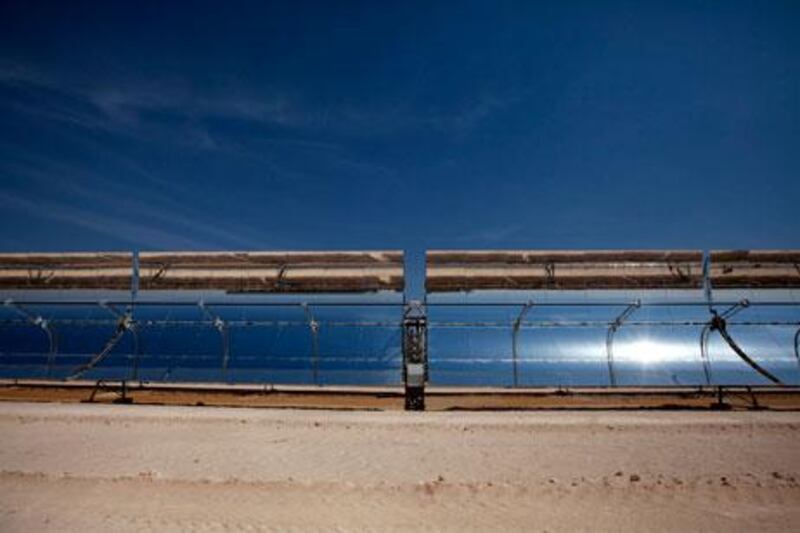Shams 1 is not only the largest solar energy project in the UAE but also in the whole of the Middle East and North Africa region, according to Dr Sultan Al Jaber, the chief executive of Masdar, the Abu Dhabi-based alternative energy company that owns 60 per cent of the Shams Power Company.
It is, he said, "a signal that the UAE is in the vanguard of renewable energy in the region and the world.
"The project also represents the first major step in diversifying the UAE's energy supply - extending the life of the UAE's hydrocarbon resources and supporting our long-term energy and economic security.
"Today, the UAE is the only Opec nation to be supplying renewable energy and hydrocarbons to the world."
And Shams 1, which when fully operational will produce 100 megawatts (MW) of power, enough for 20,000 homes, is just the start of the country's ambitions in renewable energy, said Dr Al Jaber.
While Shams 1 is a concentrated solar power plant, using solar thermal collectors to concentrate the heat from sunlight, producing steam that powers a turbine and thus generating electricity, Masdar is also looking at utilising solar photovoltaic (PV) technology, which captures the light of the sun and turns it into electricity directly.
"Recent drops in the price of PV panels of up to two-thirds are making PV an increasingly attractive option in the UAE and around the world," said Dr Al Jaber.
Masdar is currently working on another 100MW project - Noor 1 - that will rely on PV technology.
The project "continues to move forward" and is "currently in the value-engineering stage", said Dr Al Jaber.
While the reductions in price make PV an attractive technology, concentrated solar power offers an advantage in that the heat collected during the day can be stored, allowing the plant to continue generating electricity at night - impossible with PV.
This has already been demonstrated in Spanish solar projects such as Gemasolar, Valle 1 and Valle 2, in which Masdar has invested, said Dr Al Jaber.
Besides Europe and the UAE, the company has ambitions for the wider Middle East.
"Holding nearly half of the world's renewable energy potential, the Middle East and North Africa region has an economic, social and environmental opportunity to harness its abundant clean energy resources," said Dr Al Jaber.
"As such, Masdar is most certainly planning to invest in more renewable-energy projects regionally as we see a tremendous investment opportunity here.
"The lessons learnt by designing, developing and now operating Shams 1 will be invaluable as we continue to look for promising investment opportunities in the region."
In developing Shams 1, Masdar is partnering with the French oil company Total, and Abengoa of Spain, which specialises in the engineering and construction of projects in the power and water sectors. Each of the two companies has a 20 per cent stake in the project.
For Christophe de Margerie, Total's chief executive, partnering with Masdar for the project was "a logical fit" considering the company's long involvement in Abu Dhabi's oil sector.
"Abu Dhabi and Total have enjoyed a common story for almost 75 years and we are always willing to strengthen our activities here," he said.
"We are immensely proud to have been part of the challenging adventure that was Shams 1 construction. We have shown that we are an innovative and trustworthy partner.
"Solar power is a very logical investment regarding the volume of solar energy received every day by each square kilometre of land in the Gulf." said Mr de Margerie.
"Solar energy is more and more going toward competitiveness versus other conventional energies sources."





